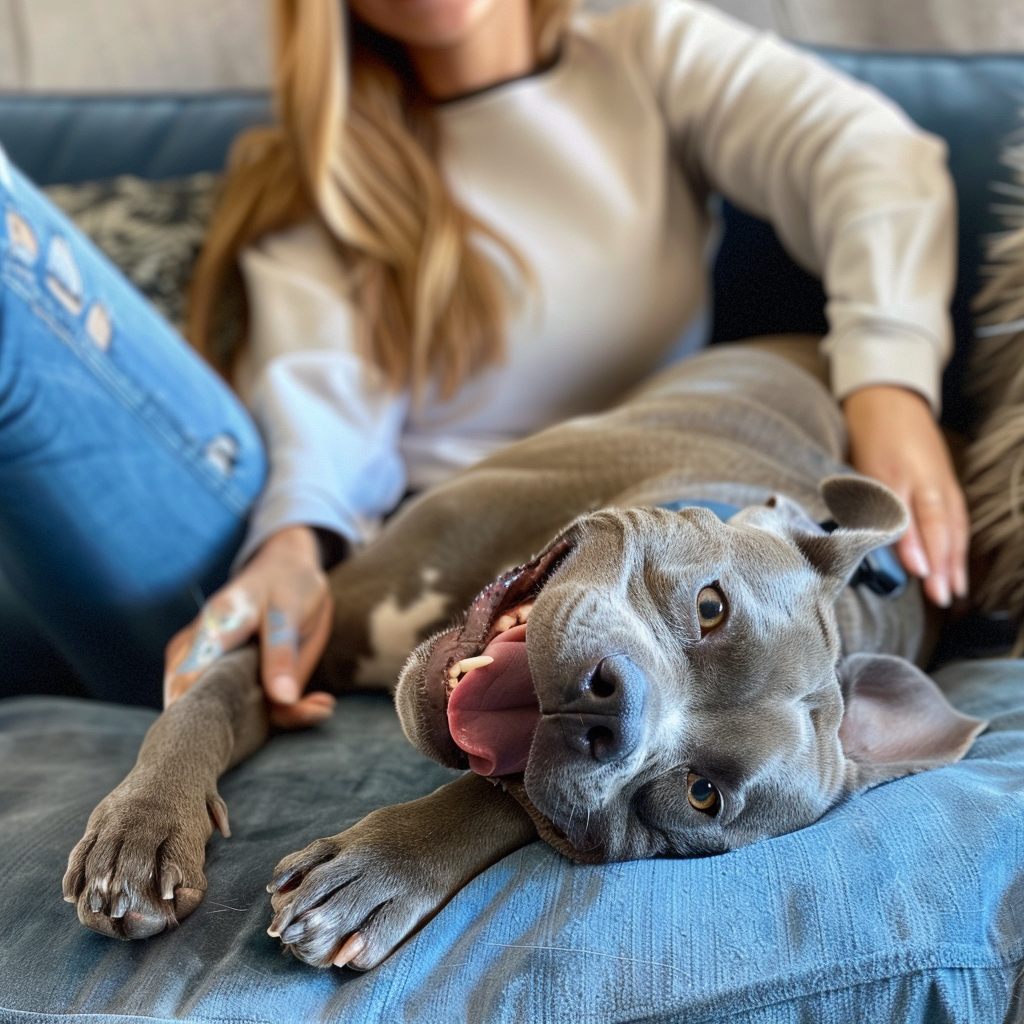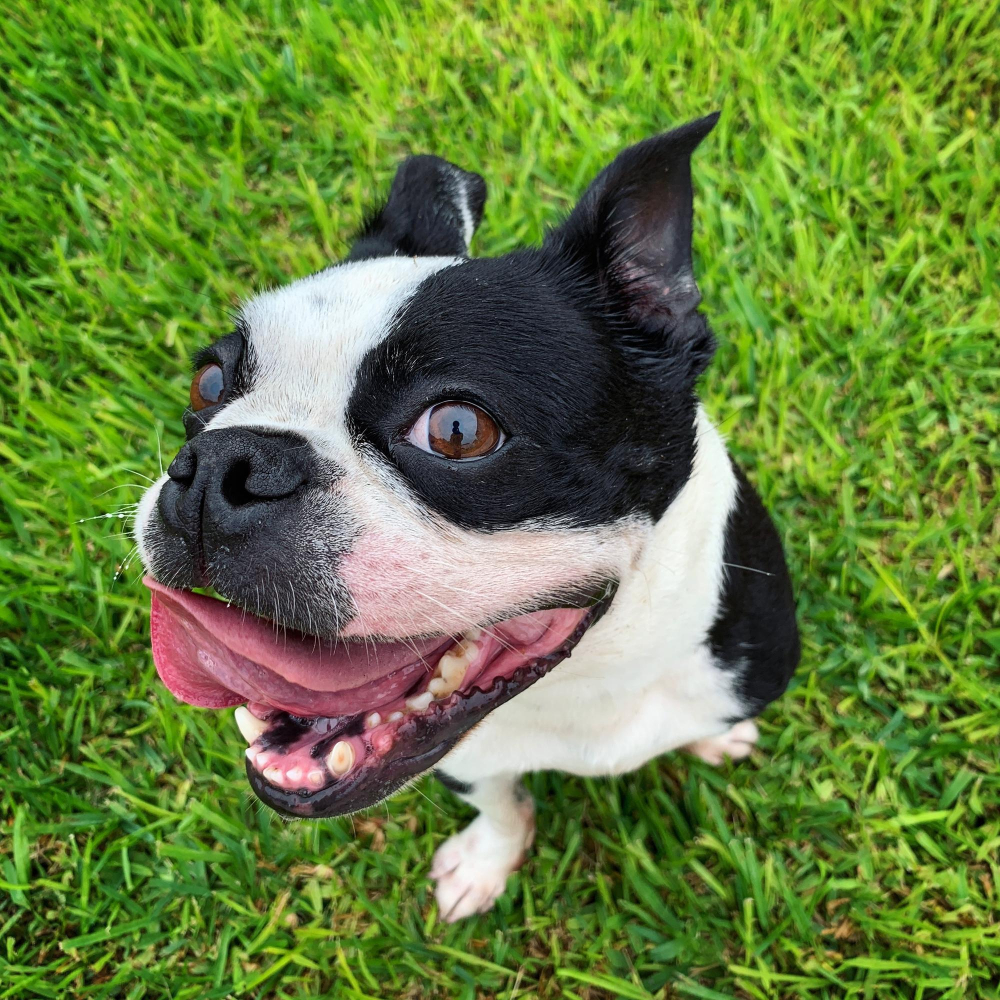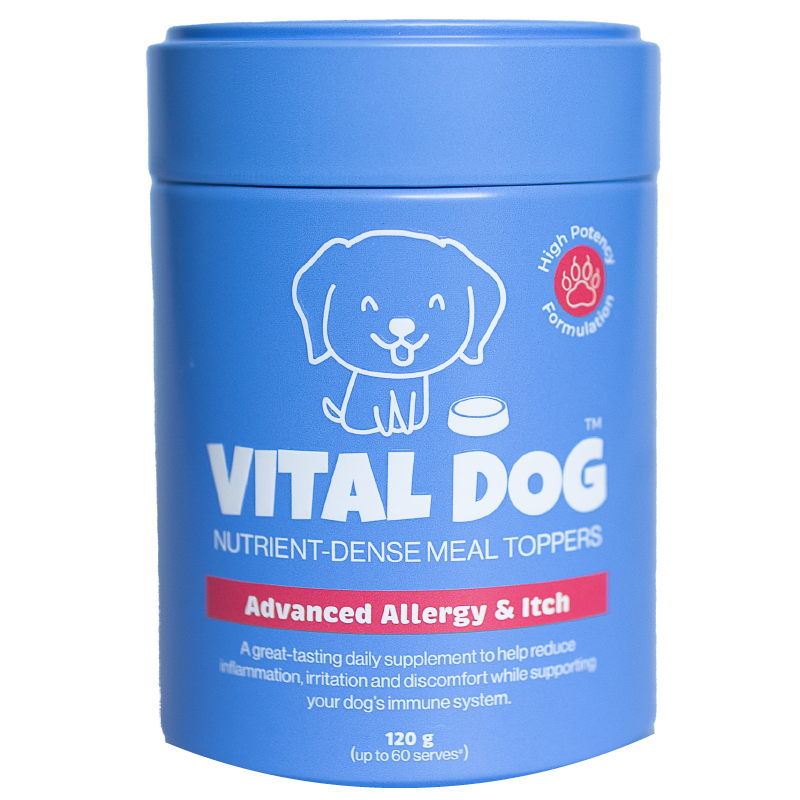If you’ve ever watched your dog scratch away like there's no tomorrow, you know how concerning and frustrating it can be. It can feel helpless to see your best mate suffer with head tilts, paw-licking and red-raw ears accompanied by that signature yeasty smell. Itchy dogs are not just uncomfortable; they can also develop secondary issues like skin infections and hair loss. We’re here to help prevent that from happening by providing you with powerful information and advice to keep your dog happy, healthy, and itch-free.

Allergies and Immune Hypersensitivity
Allergies in dogs are essentially an overreaction of the immune system to substances it deems harmful (but can indeed be harmless). These substances, called allergens, can be anything from pollen to specific proteins in food. When a dog with hypersensitivity encounters an allergen, their immune system kicks into overdrive, releasing histamines and other chemicals that cause inflammation and itching.
There are several types of hypersensitivity reactions that dogs may experience after exposure to an allergen, and it commonly shows up in symptomatic form as redness, itching, heat and discomfort.
Signs and Symptoms
How can you tell if your dog’s itchiness is more than just a casual scratch? Here are some signs that your dog’s itching might need to be attended to sooner rather than later:
- Excessive Scratching: If your dog seems to be scratching more than usual and can't seem to stop.
- Licking or Chewing: Dogs often lick or chew at itchy areas, particularly their paws, legs, or belly.
- Red or Inflamed Skin: Look for patches of red, inflamed skin, especially in areas where your dog has been scratching or licking.
- Hair Loss: Persistent scratching can lead to bald spots or thinning hair.
- Hot Spots: These are localised areas of inflamed, infected skin that can develop from excessive licking or scratching.
- Ear Infections: If your dog is constantly scratching at their ears, shaking their head, or has a foul smell coming from their ears, they might have an ear infection related to an allergy.
What Commonly Causes Itchiness in Dogs?
Before we dive into solutions, it’s essential to understand what might be causing your dog’s itchiness. Itchiness, or 'pruritus' in fancy veterinary terms, can stem from several factors, and pinpointing the exact cause is key to effective treatment.
1. Diet Intolerances or Sensitivities
Just like humans, dogs can have food intolerances or sensitivities that manifest as itchy skin. Common culprits include grains, which are used excessively in many processed dog foods, along with soy, dairy and certain proteins like chicken. When your dog’s body mistakenly identifies these ingredients as invaders, it can trigger an immune response that can lead to inflammation and the accompanying, relentless itching.
2. Allergens (Including Seasonal Allergens)
Environmental allergens are another big player in the itchiness game. Pollen, mold, dust mites, and even grass can turn your dog into an itchy mess. Seasonal allergies are particularly common; if your dog is scratching more in the spring, seasonal allergens might be involved.
3. Irritants
Sometimes it’s not technically not an allergen, but an irritant, that is causing the problem. This could be a new shampoo, a cleaning product, or even something as simple as grass or sand getting stuck in their coat. Certain materials in bedding or clothing can also irritate your dog’s skin.
4. Gut Issues, Including ‘Leaky Gut’
Gut health is often overlooked when it comes to skin conditions, but there’s a strong link between the two. A healthy gut helps regulate the immune system, while an unhealthy gut can lead to conditions like leaky gut syndrome. Certain foods, especially in the presence of unhealthy gut bacteria populations, may trigger leaky gut which allows toxins and partially digested food particles to enter the bloodstream, causing an immune response that can manifest as itchy skin. It's often been said that the skin will eventually tell the tale of what's going on in the internal environment.
Veterinary Treatments
If you suspect your dog is suffering from allergies or another underlying condition causing their itchiness, a visit to the vet is a good first step. Common veterinary treatments for itchiness often include:
- Antihistamines: These can help reduce the histamine response that leads to itching.
- Corticosteroids: These are powerful anti-inflammatory drugs that can quickly reduce itching, but they’re usually only used short-term due to a range of side effects that are commonly experienced.
- Antibiotics: If your dog’s scratching has led to a bacterial infection, antibiotics may be necessary, however this may lead to an imbalance microbiome.
- Medicated Shampoos: These can help soothe the skin and reduce itching, particularly in cases of contact dermatitis.
- Allergy Testing: In some cases, your vet may recommend allergy testing to identify specific allergens that are affecting your dog.
While any of these treatments can be effective, they mainly address the symptoms, not the root cause, meaning issues may resurface time and time again. This is where integrative and complementary support can be helpful.
Dietary, Lifestyle and Environmental Interventions
If you’re looking for a more holistic, comprehensive approach to managing your dog’s itchiness, complementary support can be very effective. Here are some ways that you can help your dog from the inside out.
1. Diet and Food
One of the first things to consider is your dog’s diet. Many pet parents have success from switching to a hypoallergenic diet or an elimination diet to help identify food sensitivities and avoid them, ongoing. Transitioning from highly-processed, high carbohydrate dry kibble to raw, biologically-appropriate foods (BARF diets) appears to benefit the majority, with many stories of complete symptomatic reversal within weeks to months.
Irrespective of the dietary approach chosen, including omega-3 fatty acids from sources such as fatty fish, fish oil, hemp seeds and flaxseed, can have anti-inflammatory effects that can help reduce itching and improve skin health.
2. Supplements
Supplements can play a crucial role in supporting your dog’s skin and immune health. Here are some of the key functional ingredients that we’ve specifically included in VITAL DOG Allergy & Itch supplements to help out:
- Propolis: Known for its anti-inflammatory and antimicrobial properties, propolis can help soothe itchy skin and promote healing.
- Quercetin: Referred to as “nature’s Benadryl,” quercetin is a natural antihistamine that can help reduce allergic reactions and itching.
- Bromelain: This enzyme, derived from pineapples, helps reduce inflammation and can enhance the absorption of quercetin.
- Probiotics: Gut health is closely linked to skin health, and probiotics like Lactobacillus paracasei and Lactobacillus plantarum can work together to help reduce hypersensitivity reactions, reduce inflammation and promote gut lining integrity.
- Colostrum: Rich in antibodies and growth factors, colostrum supports the immune system and helps repair the gut lining, reducing the likelihood of leaky gut and associated skin issues.
3. Environment
It may seem obvious, but many pet parents don’t consider how our environment can play a significant role in their dog’s skin health. What our dogs sleep on, breathe in and use on their skin can all have impacts.
- Bedding: Ensure your dog’s bedding is clean and free from irritants. Hypoallergenic bedding can be a good option for dogs with sensitive skin.
- Regular Bathing: Use a gentle, hypoallergenic shampoo to keep your dog’s skin clean and free from potential allergens. Stay away from harsh chemicals and potent aromatics.
- Flea Control: Fleas are a common cause of itching in dogs. Regular flea prevention is crucial, especially if your dog spends time outdoors.
- Air Purifiers: If your dog suffers from environmental allergies, an air purifier can help reduce allergens in your home.
VITAL DOG Can Help
At VITAL DOG, we understand how distressing it can be to watch your dog suffer from itchiness. In fact, it was our own experience with our dog, Nala, and her chronic ear infections that led to the development of the very first VITAL DOG meal topper prototype. Today, we have our evidence-based Allergy and Itch formula, specifically designed to support dogs with sensitive skin and chronic itchiness and irritation.
Our formula contains a powerful blend of natural, functional food ingredients – you can learn more about it, including the full list of ingredients, here. Our products are generally safe to use alongside other treatments, however please do share the product information with your vet if prescribed any medications.

What to Expect: Timeframes to Resolve, Risks of Recurrence, How to De-Risk
When dealing with skin issues or chronic irritation of the feet and/or ears, patience is key. Typically, the longer the issue has existed, the more stubborn it can be to defeat. Here’s what some people may experience:
Timeframes
Depending on treatment(s), it may take anywhere from a few days to a few months to see significant improvements in your dog’s skin condition, especially if you’re addressing underlying causes like diet or gut health. We've had some dog parents report significant improvements in skin health and reduced inflammation within days of supplementation, and a feeding study conducted for VITAL DOG showed that several owners noticed less itching, yeasty aroma and even the regrowth of some hair in 2-4 weeks.
Risks of Recurrence
Unfortunately, vets will tell you that dogs with allergies or sensitivities may be prone to future flare-ups, particularly during allergy seasons or if exposed to specific triggers. This is less likely if root-causes of the issues have been adequately attended to.
Enduring Lines of Defence
Consistency and continuity are crucial. Keeping your dog on a suitable, nutrient-dense and hypoallergenic diet, optimising their nutrition with functional food-based supplements like VITAL DOG Allergy and Itch, and maintaining a clean, allergen-free, low-irritant environment should set you and your pooch up for success.
Conclusion
Helping your dog overcome itchiness is not just about treating the symptoms—it’s about addressing the root causes and providing ongoing support. Whether it’s through diet, supplements, and/or environmental management, there are many ways you can help your dog live a more comfortable, itch-free life. Remember, every dog is different, so it may take some time to crack the code, so keep experimenting until you’ve found the perfect solution for your furry friend. You can make a world of difference in their quality of life.


